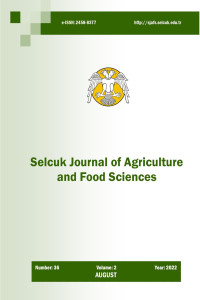Effects of Climate Changes on Rose Fungal and Bacterial Diseases in Landscape Areas of Konya Province, Türkiye
Öz
Rose, a plant belonging to the family Rosaceae, is one of the most popular and versatile flowering shrubs in urban landscape areas. In recent years, rose bacterial diseases are getting to increase and they cause significant economic losses. The severity and distribution of these problems change every year according to the changing climatic factors, growing areas, the type of roses and the level of being affected by biotic and abiotic factors. In this study, on the 106 rose cultivars located in landscape areas of Konya province was determined different diseases symptoms at various levels by carried out survey studies in 1998-2022 years. As a result of the diagnosis of obtaining bacterial and fungal isolates, bacterial blights (Pseudomonas syringae pv. syringae and P. s. pv. morsprunorum), Xanthomonas hortorum, fire blight (Erwinia amylovora) and crown gal (Rhizobium radiobacter), downy mildew (Peronospara sparsa), rust (Phragmodium mucronatum), black spot (Diplocarpon rosae), powdery mildew (Sphaerotheca pannosa var. rosae), gray mold (Botrytis cinerea) were determined as the pathogen on the rose cultivars. It is thought that the findings obtained from the study will contribute to the future development of rose cultivation by revealing the different pathogens and disease levels in roses as a result of the changing climatical conditions.
Ayrıntılar
| Birincil Dil | İngilizce |
|---|---|
| Konular | Bitki Bilimi |
| Bölüm | Araştırma Makalesi |
| Yazarlar | |
| Yayımlanma Tarihi | 30 Aralık 2022 |
| Gönderilme Tarihi | 7 Aralık 2022 |
| Yayımlandığı Sayı | Yıl 2022 Cilt: 36 Sayı: 4 |
Kaynak Göster
Selcuk Journal of Agriculture and Food Sciences Creative Commons Atıf-GayriTicari 4.0 Uluslararası Lisansı (CC BY NC) ile lisanslanmıştır.

